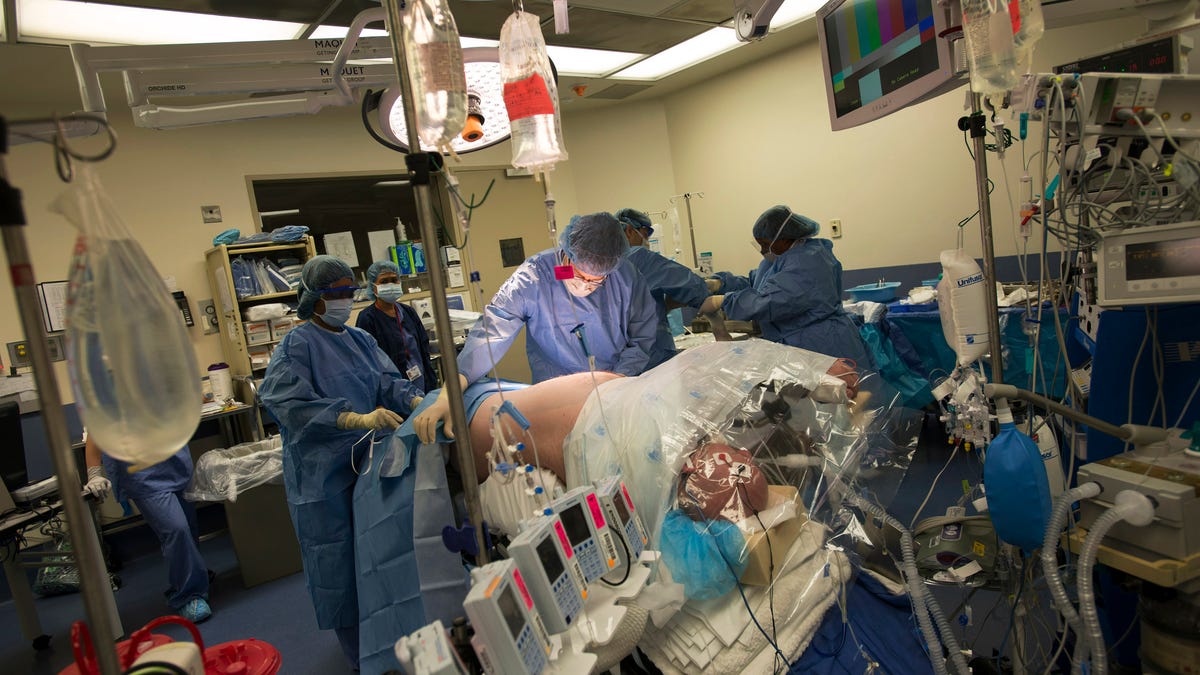**The Decision: Organ Donation and the Existential Question at the DMV**
Getting or renewing a driver’s license can be a stressful experience, made even more complex by a thought-provoking question at your local DMV: “Would you like to donate your organs after you die?” This personal and civic question delves into deep topics like the soul, life after death, and the sanctity of the human body. Surprisingly, around 58% of eligible Americans agree to donate their organs, recognizing that they won’t need them in the afterlife.
Organ donation has become an integral part of modern medicine in the last 50 years. In the US alone, there were over 40,000 transplants performed last year. However, the demand for organs is still much higher, with over 100,000 Americans on the waiting list at any given time. Tragically, 17 people die each day while waiting for an organ to become available.
If you’re curious to learn more, take a few minutes to discover the facts below.
**By the Numbers: Organ Donation in the US**
– 104,234: Number of people on the US organ transplant waiting list
– 17: Average number of people who die each day waiting for organs
– 42,000: Total number of transplants performed in 2022
– 95%: Percentage of Americans in favor of organ donation
– 170 million: Number of Americans registered as organ donors, making up about 58% of eligible Americans
– 0.3%: Percentage of Americans whose bodies are suitable for organ donation after death
– 22%: Increased likelihood of women being organ donors compared to men
– 24%: Increased likelihood of registered Republicans being organ donors compared to Democrats
**Explain it Like I’m 5: The Process of Organ Donation**
1. **Brain death**: When doctors can’t save a patient’s life, they declare them brain-dead. Machines then support the donor’s body.
2. **Evaluation**: Medical professionals assess the body’s suitability for organ donation.
3. **Consultation**: If the body is suitable, the doctor confirms the patient as an organ donor in a state or national registry. In cases where the patient is not a donor, consent from the next of kin is obtained posthumously.
4. **Placement**: The patient’s information is matched with the national organ donor waiting list to find suitable recipients for the organs.
5. **Removal**: Organs are surgically removed as soon as possible after death. In many cases, the surgery is not invasive, allowing for an open-casket funeral.
6. **Notification**: The family of the deceased is informed about the organ donation in the weeks following the operation.
**Origin Story: Ancient Tales of Organ Transplants**
Although modern organ transplantation emerged in the 20th century, the idea of harvesting and transplanting living organs has been speculated since ancient times. The earliest reference to organ transplantation can be found in a 5th-century BCE Taoist text, recounting the story of an ancient doctor conducting a heart transplant to restore harmony to two individuals’ personalities.
Other accounts also exist, such as the tale of a Catholic bishop dreaming about saints switching his gangrenous leg with that of a deceased Ethiopian man. These stories, however, are apocryphal and lack historical verification. It wasn’t until the 16th and 19th centuries that organ transplants, including skin grafts and thyroid tissue transplantation, were attempted and laid the foundation for modern organ transplants.
**Quotable:**
“Lord my body has been a good friend, But I won’t need it when I reach the end.” – Cat Stevens, “Miles from Nowhere”
**Pop Quiz: The Longest Successful Animal-to-Human Organ Transplant**
The answer is A. Pig. Pig organs have been successfully transplanted into humans and have been known to function for extended periods.
**The Kidney Question: A Highly Demanded Organ**
Kidney donation is one of the few organ transplant operations that can be done while the donor is alive. In fact, 84% of Americans expressed their willingness to donate a kidney to a close friend or family member, while 49% would consider donating to a stranger. This is good news considering that about 88,901 patients are waiting for a kidney transplant, but only 25,498 transplants were performed in 2022. The demand for kidneys is not being met, and some Americans may be overstating their willingness to donate.
**Fun Fact: Famous Organ Donors**
Jerry Orbach, the renowned actor known for his roles in Law and Order and Dirty Dancing, made headlines after his death for donating both of his corneas to New Yorkers in need.
**Religious Beliefs and Organ Donation**
Most major religious organizations and representatives allow their adherents to donate organs. Abrahamic religions like Judaism and Catholicism actively encourage organ donation as an act of charity. Other faiths, including mainline Protestantism, Mormonism, Jehovah’s Witnesses, and Islam (after an initial opposition), leave the decision to the individual. Buddhism, Hinduism, and many other religions have no official stance on organ donation, while the Romani people discourage it due to their belief that the soul retains its physical shape after death.
**Poll: Would You Donate a Kidney?**
– Yes, to anyone who needs one
– Yes, but only to a loved one
– No, under no circumstances
Let us know your answer, and we’ll keep it confidential.
**Let’s Talk!**
In last week’s poll about audiobooks, we found that 47% of respondents felt their kids listening to Mark Twain on headsets was a sign of raising geniuses, while 38% thought of Minecraft instead. 15% preferred the written page.
**Tweet (or X?) This!**
(Optional HTML tags retained)
“What did you think of today’s email? Share your thoughts and let us know what we should obsess over next!”
**Today’s email was written by Diego Lasarte, an organ donor, and edited and produced by Annaliese Griffin, who has experienced organ loss.**
**Pop Quiz Answer**: A. Pig
Denial of responsibility! Vigour Times is an automatic aggregator of Global media. In each content, the hyperlink to the primary source is specified. All trademarks belong to their rightful owners, and all materials to their authors. For any complaint, please reach us at – [email protected]. We will take necessary action within 24 hours.


